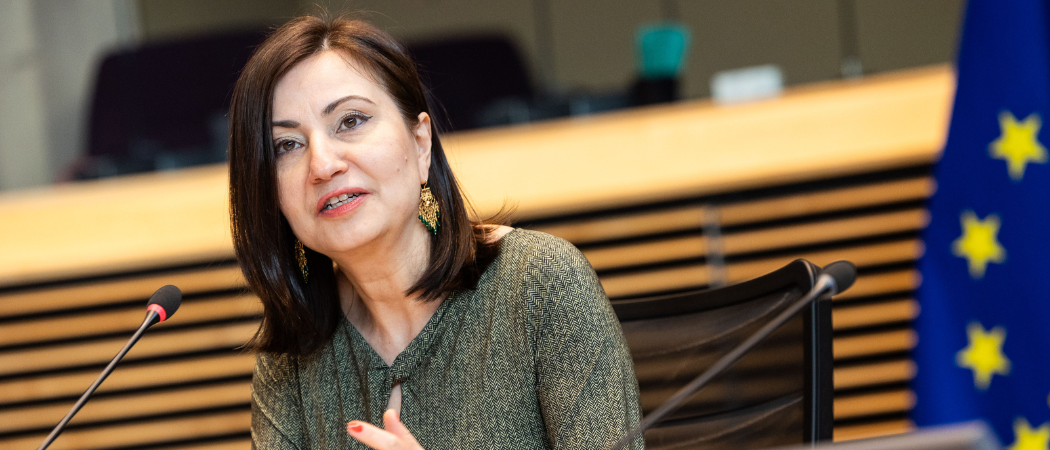Research commissioner will not attend an informal meeting of research ministers in Budapest following Viktor Orbán’s trips to Moscow and Beijing

Research commissioner Iliana Ivanova. Photo credits: Jennifer Jacquemart / European Union
It has been confirmed that research commissioner Iliana Ivanova will not attend an informal meeting of EU research ministers in Budapest in September, due to ongoing tension stirred by Hungarian Prime Minister Viktor Orbán’s solo trip to Moscow.
As holder of the rotating presidency of the EU Council, Hungary plans to organise a number of informal meetings in its capital, in addition to the formal Council meetings which usually take place in Brussels.
On 15 July, the Commission’s chief spokesman, Eric Mamer, announced that commissioners would be asked not to attend the informal meetings.
“In light of recent developments marking the start of the Hungarian Presidency, the President has decided that [the Commission] will be represented at senior civil servant level only during informal meetings of the Council,” he wrote on X.
This would typically mean the meeting is attended by the director general or deputy director general, meaning in this case it would be Marc Lemaître, Signe Ratso, or Joanna Drake, a Commission spokesman told Science|Business.
Commissioners will continue to attend formal meetings of the Council of ministers, since these have an official legislative function. That includes the Competitiveness Council on research and space on 29 November, by which time Ivanova may have made way for a new research commissioner.
The decision is intended to signal the Commission’s disapproval of Orbán’s recent trips to Moscow and Beijing, where he met with leaders Vladimir Putin and Xi Jinping to discuss the situation in Ukraine.
Dubbed a “peace mission” by Orbán, Commission President Ursula von der Leyen last week called the visit to Russia “nothing but an appeasement mission”, and leaders feel the trip undermined the image of a united Europe.
Despite this stance, the informal meeting of EU higher education and research ministers on 16 and 17 September is due to go ahead in the Hungarian capital as planned.
On Monday, Josep Borrell, High Representative of the EU for Foreign Affairs, announced he had decided to convene informal meetings of EU foreign ministers in Brussels rather than Budapest starting after the summer. During this week’s Foreign Affairs Council, member states “overwhelmingly criticised Hungary’s lack of sincere and loyal cooperation”, Borrell said.
This decision is unlikely to impact other policy areas because meetings of the Foreign Affairs Council are unique in that they are chaired by the High Representative, and not by the rotating presidency. That means it is up to Borrell to decide where they are held.
The Hungarian presidency is also planning to host a number of research-related conferences in Budapest in the coming months on topics including innovative regions, bioeconomy, and brain health.
Horizon Europe ban
Tensions between Hungary and the EU predate Orban’s trips and are not only due to his controversial geopolitical stance.
In December 2022, the EU cut off 30 higher education and cultural institutions in Hungary, including 21 universities, from Horizon Europe and Erasmus+ funding. The suspension came in response to law changes transforming these institutions into ‘public trust foundations’, whose governing bodies contain allies of the prime minister, resulting in concerns about transparency and academic freedom.
A recent report from the Hungarian Young Academy, an association of junior scientists, concluded the suspension had dealt a “body-blow” to the international reputation of Hungarian science, and could have long-term consequences for researchers.
Around 40% of the Hungarian early career researchers surveyed said they had experienced the negative impact of the decision.
Many respondents reported that their international partners wanted to exclude them from ongoing consortia even though their institution was unaffected by the suspension, or were hesitant to apply with Hungarian partners even for EU funds not affected by the ban.
The ban only relates to receiving EU funds, not to participation in EU projects, because Hungary last year created a guarantee fund to make up the difference. However, there have been complaints this was unclear and there has been a negative effect on partnerships.
In May 2024, the director general of the Commission’s research directorate, Marc Lemaître, invited national contact points – advisers who support Horizon Europe applicants – to spread the message that Hungarian participants can still join Horizon Europe projects.





 A unique international forum for public research organisations and companies to connect their external engagement with strategic interests around their R&D system.
A unique international forum for public research organisations and companies to connect their external engagement with strategic interests around their R&D system.